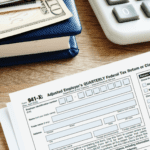Tax-related identity theft has impacted more than 1 million federal taxpayers to date, according to a recent USA Today article. While the same article writes that incidents of identity theft related to fraudulent tax returns has decreased in the past year, IRS Commissioner John Koskinen recently testified that the nature of tax identity theft has shifted: Once committed by individuals, he says tax identity theft now involves sophisticated crime syndicates who hack internal online systems to gain personal taxpayer information.
Here are some ways you can protect yourself from tax identity theft:
Be vigilant with your Social Security number. Identity theft that involves your bank account number, credit card numbers or physical payment cards is stressful — but those numbers can be changed and re-assigned to stop identity thieves. Changing your Social Security number isn’t quite as simple of a process. Once a person has your Social Security number, he or she can attempt any number of identity theft crimes — including tax identity theft.
If you receive correspondence referencing accounts you’ve tried to open or allegedly own that you do not recognize, it could be a warning your Social Security number has been compromised — and that tax identity theft could be next.
Know what’s on your credit report. Check your free annual credit report each year to confirm the accounts and activity on it. Report the suspected fraud immediately to the credit bureaus and to IdentityTheft.Gov (managed by the Federal Trade Commission). If their investigation indicates your Social Security number may have been compromised, consider reporting the event to the IRS, to take pre-emptive measures (like securing a special PIN code to file) so you don’t become a victim of IRS tax identity theft.
Check the status of your tax filing and refund. Often, when filing tax returns, taxpayers find out about tax identity theft when they cannot file a return online because the IRS claims to have already received their tax return — but that’s not always the case. For example, you may not know that you’re a tax identity theft victim until you receive a letter from the IRS stating it has already received your return, if you filed by mail or through a third party. One woman explained in the Huffington Post that she found out she was a victim of an identity theft crime when she contacted the IRS questioning why she didn’t receive her tax refund.
Be proactive in confirming that your tax return was accepted, and has been processed completely before assuming you’re not a tax identity theft victim.
Know who you hire to prepare your taxes. The IRS explains that dishonest tax preparers may edit the reported income or expenses on returns they file to score a bigger tax return they can direct to their own account. In fact, that very scam is one of the many acts of tax-related identity theft that has caused more than 20 Liberty Tax Service franchises to be investigated. Ensure you can trust who you hire to help with your personal tax information, even if he or she claims to be a professional.
What to Do If You Are a Tax Identity Theft Victim If you suspect you’re a victim of tax identity theft, take immediate action to minimize the damage: File a police report, contact the credit bureaus to put a credit freeze on your report to prevent further fraud, contact the IRS, and your state’s tax division for support and guidance. If you’re being sued due to tax identity theft, consider hiring a tax attorney. A qualified professional can help you understand your rights and negotiate with any creditors (including the IRS) who may be demanding payment despite your reports of fraud, so your financial life isn’t ruined by identity theft.






 Steven N. Klitzner, P.A. is a tax attorney based in Miami, Florida. He has been practicing tax law for over 40 years, and currently holds a 10.0 rating by Avvo. Mr. Klitzner was appointed to the IRS Service Advisory Council in 2021 and is...
Steven N. Klitzner, P.A. is a tax attorney based in Miami, Florida. He has been practicing tax law for over 40 years, and currently holds a 10.0 rating by Avvo. Mr. Klitzner was appointed to the IRS Service Advisory Council in 2021 and is... 





